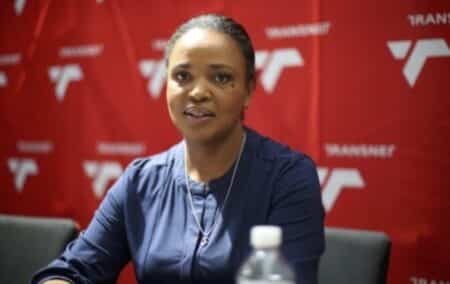Transnet CEO, Portia Derby, has asked government to reconsider the procurement regime for state-owned entities (SOEs), to ease requirements for procuring goods and services.
She told the Black Business Council (BBC) annual summit on Thursday that the government should introduce sector specific licensing requirements for procurement. This would level the playing field between SOEs and the private sector.
Without sector licensing, ‘You will have no state-owned enterprises because the private sector will outcompete us and you will have no manufacturing because you would’ve left the private sector to do whatever they have to do because, trust me, they will be buying from the cheapest markets’, Derby says.
Transnet can’t enter materials and spares agreements, because the regulations in the Public Finance Management Act (PFMA) prevent SOEs from entering into long-term agreements without providing evidence of funds.
The regulations prevented Transnet from being able to regularly maintain its infrastructure.
‘These agreements make sense if they are 10 or 15 years because you tie them up to the life of the asset. And because we couldn’t do that it means that long lead items … we could only buy when we could point to the money’, Derby says.
Derby said shifting towards a maintenance culture enhances the frequency of obtaining orders.
Transnet’s procurement policies have been under scrutiny because of the four controversial contracts with China Railway Rolling Stock Corporation (CRRC) for more than 1,000 locomotives to renew Transnet’s rolling stock.
The initial estimated tender was R38.6bn, which shot up to R54.5bn amid claims of corruption.
The tender was suspended by Transnet without it receiving the remaining spare parts and components. About 120 locomotives stand idle.
‘What we have to do is to start industrialising based on a maintenance programme, because maintenance is something that has to be done regularly’, Derby said.


